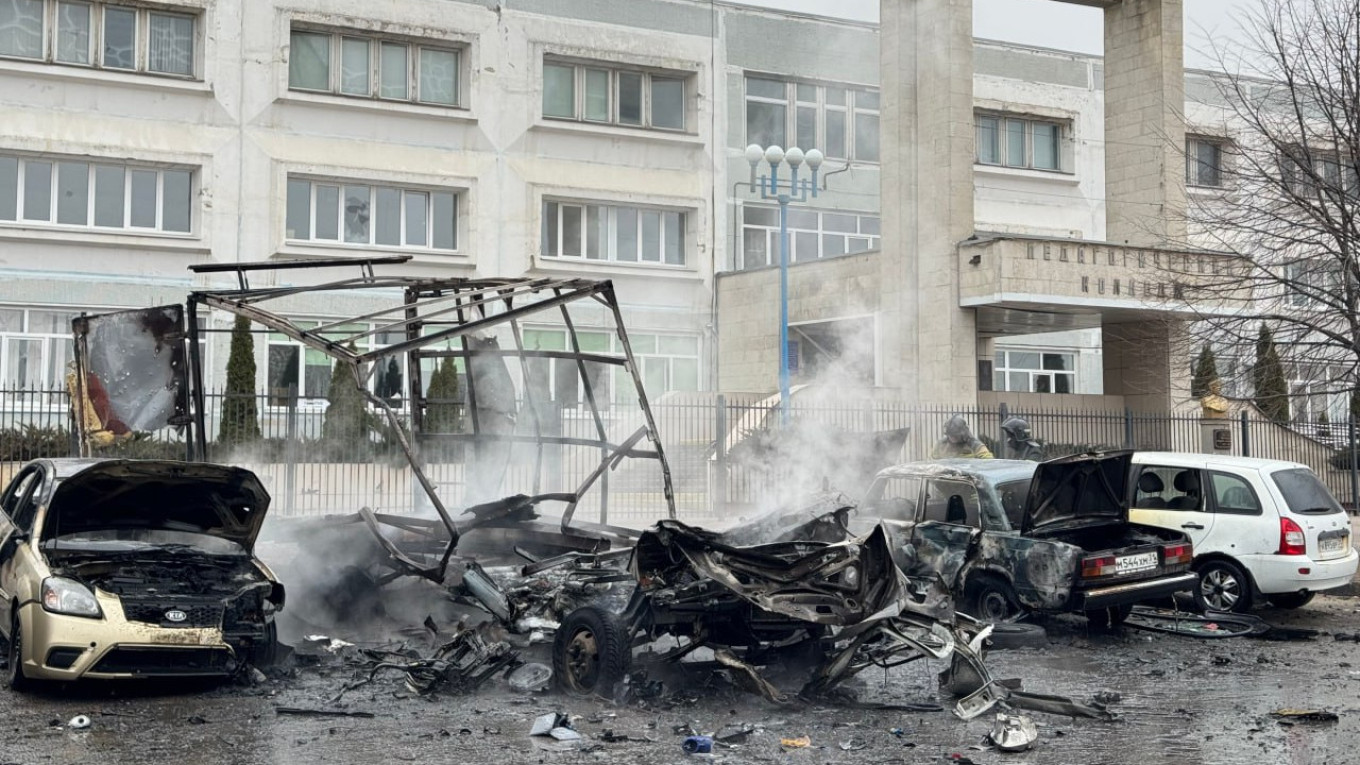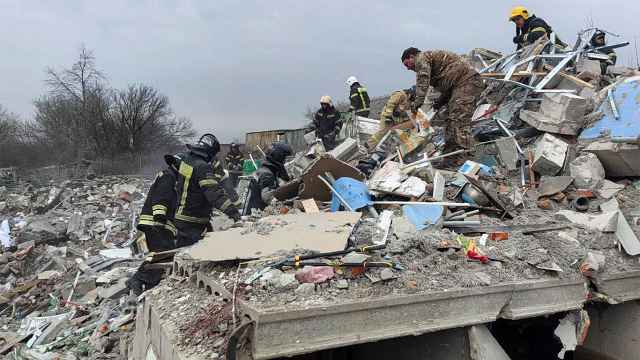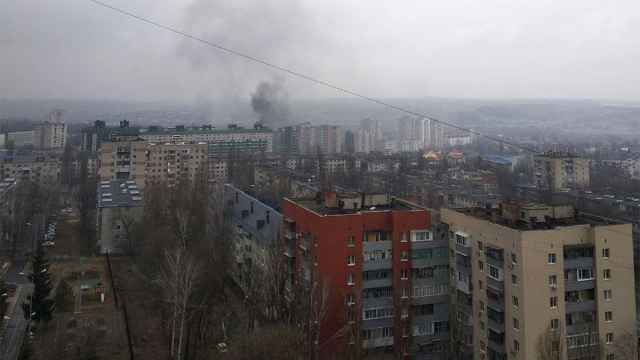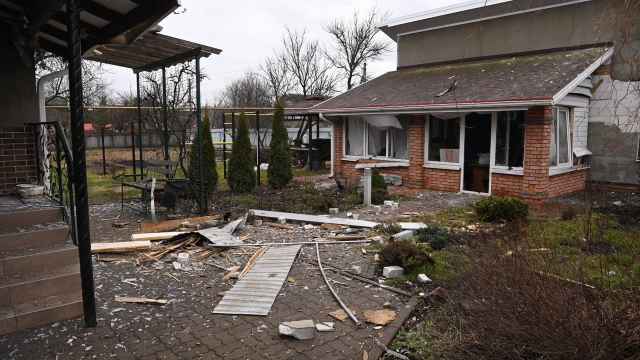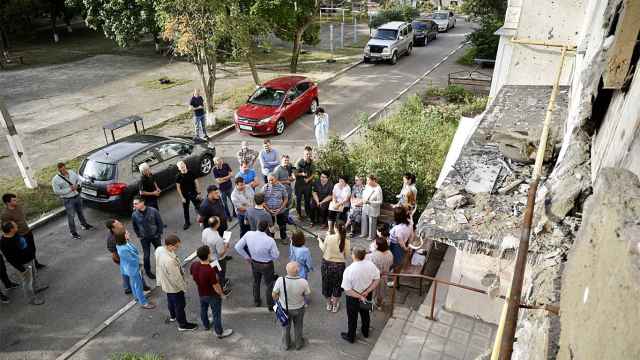Ukrainian bombardments killed two people and set an oil facility ablaze in Russia on Saturday, the second day of showpiece elections guaranteed to cement President Vladimir Putin's hardline rule.
Presidential polls opened this week but voting has been marred by an uptick in fatal Ukrainian aerial attacks and a series of incursions into Russian territory by pro-Ukrainian sabotage groups.
Fresh bombardments prompted authorities to close schools and shopping centers in the Belgorod region bordering Ukraine, undermining the Kremlin's efforts to isolate Russians from its two-year conflict with Kyiv.
Putin, who cast his vote online, has vowed a harsh response to the assaults and accused Ukraine of trying to "disrupt" his bid for another six-year mandate.
The governor of the Belgorod region said air defense systems had downed eight Ukrainian missiles but two residents were killed and others injured.
"A man was driving a truck when a shell hit him, after which the car crashed into a passenger bus. The people on it were not injured," Vyacheslav Gladkov wrote on social media.
"Another woman was killed in a parking lot where she and her son came to feed the dogs. Medics are fighting for her son's life," he added.
In a separate post, Gladkov announced that schools and shopping centers in the city of Belgorod and some surrounding districts would close temporarily over the coming days, the second time this month.
Russia's Defense Ministry earlier said it had downed rockets, missiles and drones in the border regions of Belgorod and Kursk which have suffered an uptick in fatal attacks in recent weeks.
Putin vows revenge
The Ministry later said Russian forces had fought off more attempted infiltrations by "Ukrainian militant sabotage and reconnaissance groups".
Kremlin proxy officials in the occupied Kherson region of southern Ukraine meanwhile said one person was killed and four wounded in a drone attack.
The border attacks were a concern for voters hundreds of kilometers away in the town of Sergiev Posad outside Moscow, famous for its ornate Orthodox monastery with golden onion domes.
Casting her ballot from home with the help of election officials going door-to-door to collect votes from the elderly, 87-year-old Inessa Rozhkova said she hoped the polls would bring about an end to the conflict with Ukraine.
"Can you imagine how many people died? And now our border villages are suffering. We worry for them," she said.
In a nearby polling station set up in the vocational school, 68-year-old Elena Kirsanova came with her husband to vote for Putin.
"They try to scare us, but this is not a nation that can be intimidated," Kirsanova told AFP.
The 71-year-old has been in power in Russia since the last day of 1999 and is set to extend his grip over the country until 2030.
If he completes another Kremlin term, he will stay in power longer than any Russian leader since Catherine the Great in the 18th century.
He faces no genuine competition in the vote, having barred two candidates who opposed the conflict in Ukraine, and around one month after his main opponent, Alexei Navalny, died in an Arctic prison in unexplained circumstances.
The Kremlin has pitched the election as an opportunity for Russians to show they are behind Moscow's full-scale military campaign in Ukraine, where voting is also being held in occupied territory.
The first day of voting on Friday was however marred by acts of vandalism in polling stations, with a spate of arrests of Russians accused of pouring dye into ballot boxes or arson attacks.
Oil facility ablaze
At least two more Russians — one in the central city of Yekaterinburg and one in the western exclave of Kaliningrad — were accused by authorities of dousing ballots with green ink.
The substance being poured into the ballot boxes resembles zelyonka, a surgical antiseptic used previously by pro-Kremlin actors to douse on opposition politicians, including Navalny.
The ruling United Russia party that staunchly backs Putin meanwhile announced it was suffering a large-scale hacking attack on its website.
The FSB security service also announced a spate of arrests, as polls opened, of Russians it said were aiding Ukrainian forces or planning to carry out sabotage at military and transport facilities.
Ukrainian attacks on Russia have extended well beyond border regions too with Kyiv's forces targeting oil facilities deep inside Russian territory over recent weeks.
The governor of the Samara region that lies around 800 kilometers (500 miles) from the front lines said Saturday that Ukrainian drones had targeted two oil refineries, igniting a blaze at one of them.
A defense source in Kyiv told AFP the attack was planned by the SBU security services as part of "a strategy to disrupt the economic potential of Russia."
"Each such defeat reduces the flow of petrodollars that feeds Russia's war economy," the source said.
A Message from The Moscow Times:
Dear readers,
We are facing unprecedented challenges. Russia's Prosecutor General's Office has designated The Moscow Times as an "undesirable" organization, criminalizing our work and putting our staff at risk of prosecution. This follows our earlier unjust labeling as a "foreign agent."
These actions are direct attempts to silence independent journalism in Russia. The authorities claim our work "discredits the decisions of the Russian leadership." We see things differently: we strive to provide accurate, unbiased reporting on Russia.
We, the journalists of The Moscow Times, refuse to be silenced. But to continue our work, we need your help.
Your support, no matter how small, makes a world of difference. If you can, please support us monthly starting from just $2. It's quick to set up, and every contribution makes a significant impact.
By supporting The Moscow Times, you're defending open, independent journalism in the face of repression. Thank you for standing with us.
Remind me later.


